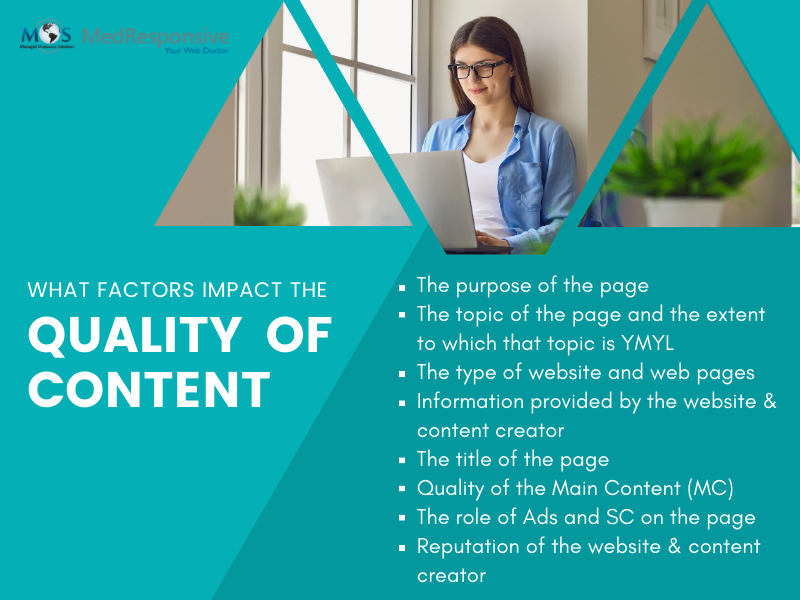Google always focuses on content quality. The Page Quality rating is an important factor in determining the ranking of a web page in search engine results, and a higher rating can result in better visibility and higher rankings.
Google recently updated its search quality raters guidelines. It has added the letter E to E-A-T, which stands for Experience. So now it’s E-E-A-T – Experience, Expertise, Authority, and Trust (E-E-A-T). Now, E-E-A-T is one critical factor that Google uses to evaluate the overall quality of a web page. The updated PDF document is now about nine pages longer, adding up to 176 pages up from 167 pages in the previous version.
Page Quality rating helps search engines evaluate how well the page achieves its purpose. This rating takes into account factors such as the content of a page, its structure, and its purpose, to determine whether it provides a positive user experience.
According to Google’s updated Search Quality guidelines (Section 3.4 page 26), trust is crucial to a successful strategy. Trust is the extent to which the page is accurate, honest, safe, and reliable. Google says, “Trust is the most important member of the E-E-A-T family because untrustworthy pages have low E-E-A-T no matter how Experienced, Expert, or Authoritative they may seem.”
Experience, Expertise and Authoritativeness are key concepts that can support the assessment of trust.
E-E-A-T: Why Experience Matters in Content
Content produced by someone who has first-hand, real-life experience on the topic at hand, has more value than that written by just any one. Content will become trustworthy and achieve its purpose well, when created by people with a wealth of personal experience. For example, content from a person who has actually used a product or actually visited a place will be of more value that content from one without real-life experience.
Google asks, when you write content, does that “content also demonstrate that it was produced with some degree of experience, such as with actual use of a product, having actually visited a place or communicating what a person experienced?”
Expertise
Expertise is the extent to which the content creator has the necessary knowledge or skill regarding the topic they’re writing about. Different topics require different levels and types of expertise to be trustworthy. Expertise matters, mainly for YMYL (Your Money or Your Life) content.
Authoritativeness
To determine authoritativeness, Google takes the author, the content, and the website itself into account. The authority of content creator and the website matters. Authoritativeness is determined by factors such as — whether your site is an authority on the topic, do any other experts link to or mention your content, whether you content is used in research, have you received any reviews by fellow experts, and more. Google always focuses on providing their users with the best possible results for their search query, and it will focus on the best source when it comes to more information on a topic.
Experience, Expertise, and Authoritativeness may overlap for some page types and topics, and different combinations of E-E-A may be relevant to different topics. While creating content, consider the purpose, type, and topic of the page, and provide informative content, and not just promotion stuff. Google has provided clearer guidance for creating original and helpful content for people in its search quality rater guidelines.
Providers of professional content writing services will be following Google’s guidance regarding E-E-A-T up to this point, to building the level of trust Google’s quality raters are looking for. Now they need to focus on experience as well. Adhering to E-E-A-T best practices helps content creators and website managers keep up with Google’s high standards and ensure their content will be poised to withstand all the algorithm changes rolled out by the search engine.
With such updates, Google ensures that the query results returned to their users in search are as accurate and reliable as possible.
Other Factors to Determine Content Quality
Along with trustworthiness of the page: E-E-A-T, Google’s Search Quality Raters determine the quality of your content based on other key factors such as –
However, search rankings are not directly affected by the guidelines, which are intended for Google’s human reviewers rather than bots.
As Google frequently updates its Page Quality rating algorithm to improve its accuracy and effectiveness, it’s important for website owners and a digital marketing services company to stay informed about the best practices for improving their pages’ quality and relevance.
MedResponsive is an experienced provider of top-quality SEO content writing services. Our team of copywriters and editors can provide focused content for any industry. For professional support in getting unique content, call us at (800) 941-5527.





